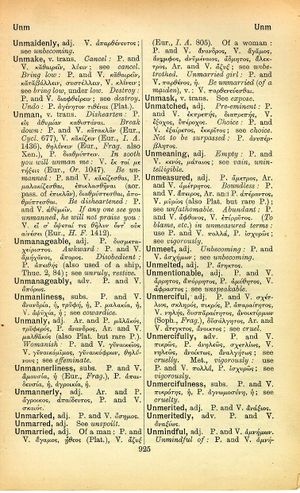unmanly: Difference between revisions
From LSJ
Ἔστιν Δίκης ὀφθαλμός, ὃς τὰ πάνθ' ὁρᾷ → Die Dike hat ein Auge, das nichts übersieht → Das Recht besitzt ein Auge, welches alles sieht
(CSV5) |
m (Woodhouse1 replacement) |
||
| Line 1: | Line 1: | ||
{{Woodhouse1 | {{Woodhouse1 | ||
|Text=[[File:woodhouse_925.jpg|thumb|link={{filepath:woodhouse_925.jpg}}]] | |Text=[[File:woodhouse_925.jpg|thumb|link={{filepath:woodhouse_925.jpg}}]] | ||
===adjective=== | |||
Ar. and P. [[μαλακός]], [[τρυφερός]], P. [[ἄνανδρος]], Ar. and V. [[μαλθακός]] (also | [[Aristophanes|Ar.]] and [[prose|P.]] [[μαλακός]], [[τρυφερός]], [[prose|P.]] [[ἄνανδρος]], [[Aristophanes|Ar.]] and [[verse|V.]] [[μαλθακός]] (also [[Plato]] but rare [[prose|P.]]). | ||
[[womanish]]: [[prose|P.]] and [[verse|V.]] [[γυναικεῖος]], [[verse|V.]] [[γυναικόμιμος]], [[γυναικόφρων]], [[θηλύνους]]; see [[effeminate]]. | |||
}} | }} | ||
Revision as of 08:55, 20 May 2020
English > Greek (Woodhouse)
adjective
Ar. and P. μαλακός, τρυφερός, P. ἄνανδρος, Ar. and V. μαλθακός (also Plato but rare P.).
womanish: P. and V. γυναικεῖος, V. γυναικόμιμος, γυναικόφρων, θηλύνους; see effeminate.

